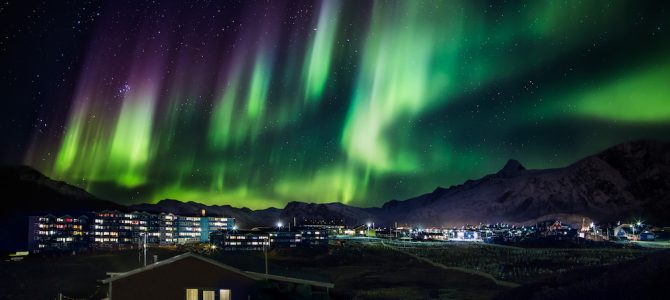Today is the winter solstice. Over all the north, tonight will be the darkest evening of the year. The darkness of winter brings cold, an absence of light sensed not with the eyes or even with skin alone, but in our very bones.
What it is about darkness of winter that makes light compelling? The stars themselves seem closer now. Is it clearer air, or the reflecting snow that magnifies their light? Is their wintry brightness all in the human imagination?
One frigid night before Christmas, I saw the Northern Lights for the first, and only, time. I was still a child, left alone after the rest of the family had grown cold and bored with squinting at a vague greenish glow in the north. But I stayed. The glow spread to push the sky upward like the dome of a great round church, radiating all colors from the brightness at its apex. Was this the star of Bethlehem, I wondered innocently?
And now, less innocently, I wonder each solstice whether Christmas will really come—is it possible for salvation to be born in so much darkness?
Darkness Causes Us to Dwell On the Light
On a Christmas Day years later, mirror-like snowflakes had spangled all the branches, reflecting the moon and stars so that every tree was lit for the season and every bush a burning one. Still later that winter, an ice storm crusted the snow so thick, a girl could walk over it without breaking through to leave a print. The full moon reflected in the great mirror of glazed snow, making night bright enough to read by. Those nights, treading carefully in nonskid boots, I’d venture out to read by moonlight while the wild rabbits played.
Perhaps it’s natural for our memories to dwell on the brightest lights of winter nights, rather than on the darkness. But it’s the darkness that makes these lights visible. We think of darkness as concealing, but darkness is also a gift for what it reveals—perhaps even when it reveals nothing. Dylan Thomas wrote of the light that breaks where no sun shines, that breaks in the place “where logics die.” Where all theories halt, suspended, irrelevant, and nothing’s left. A nothing that’s Something—perhaps what mystics called the great cloud of unknowing, the dark night of the soul. Or, if you’re Job’s friends, the whirlwind from which God speaks once we’re finished proudly brandishing our ridiculous pet platitudes and have nothing more to say.
It’s not exactly conservative etiquette to put our dark nights on display. Life is tragic for everyone, we assume. Having dark nights of the soul isn’t special, and doesn’t make you special. So your logics died. Buck up. Everyone’s gone through it. It’s nothing new. Casual contempt for pretty theories is part of the conservative mindset, right? Why grieve?
What Darkness Tells Us About Grieving
We grieve because we’re model-making creatures. We come to know reality only through the veil of theory: facts are theory-laden even when we pretend they’re not. Living by a model of reality isn’t optional, even if articulating our models is. Nor do better theories diminish the wonder of the world—far from it! Are stars less wonderful when we imagine each as its own sun, reaching us from the depths of space and time? Or the colors of the Northern Lights any less vivid for being what happens when particles blasting in from the sun rough up some rarified oxygen and nitrogen?
We grieve, too, because we’re not only model-making creatures, but motivated reasoners. We grieve for what we never had: a purely disinterested investment in the truth of the theories that we depend on, an investment that could be revoked without pain should our theories happen to prove false.
And when we reach the limits of our theories—of our cherished, beautiful models, the ones that make reality real—and we’re left wondering, wandering alone in the dark, is it any surprise when what we wonder springs from the models we’ve left behind? Even when logics die, their memory lingers, more luminous by contrast the deeper the darkness goes.









